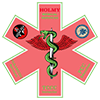Past and present projects
We are developing medical training for the future.
CCAT for the Norwegian Military
In 2012, I developed and implemented the first medical course for intensive care transport within the Armed Forces' air evacuation framework. This groundbreaking initiative trained and certified personnel as members of the Critical Care Air Transport Team (CCATT).
Graduates of the course earned the prestigious designation and wing of Medical Air Operator, establishing a vital capability for transporting critically ill or injured patients.
Before my retirement, I was entrusted with designing an upgraded CCATT course to address evolving operational needs, with delivery scheduled for spring 2023. I take great pride in the legacy of this program and the exceptional professionals it has trained.
Today, I am especially proud of this unit's ongoing contributions to international medical operations. The CCATT team is now supporting EU-led medical evacuations, transporting casualties from Ukraine to hospitals across Europe.
Their work exemplifies the critical role of military medical professionals in providing life-saving care in times of crisis.
Comunity Medical Service N-Follo Municipality (Present)
I serve as a paramedic for the Community Doctor Service in Follo, where I contribute to delivering high-quality emergency medical care in the prehospital environment. In addition to my paramedic duties,
I am also the Medical Advisor for the company responsible for providing the fully equipped emergency vehicles used in the service.
These vehicles are outfitted with state-of-the-art prehospital medical equipment, ensuring readiness to handle a wide range of emergencies. The vehicles are operated by highly skilled, emergency-qualified drivers who work seamlessly with medical personnel to enhance response efficiency and patient outcomes.
As Medical Advisor, I oversee the medical configuration of the vehicles, ensuring compliance with best practices and prehospital care standards. My role also involves advising on training protocols, equipment selection, and operational procedures to optimize the delivery of emergency medical services.
This dual role allows me to contribute directly to patient care while influencing the broader systems and resources that support life-saving interventions in our community.
From 2015 to 2021, I served as a medical instructor at the International Special Training Centre (ISTC) in Germany. During this time, I became the Assistant Officer-in-Charge (OIC) on the team that developed the NATO Special Operations Combat Medic (NSOCM) course. We successfully launched the pilot course in 2016.
In 2017, the NSOCM course was accredited as a Diploma in Special Operations Military Medicine, awarding 60 ECTS credits upon completion.
The NSOCM program is a rigorous 24-week course designed to train NATO Special Operations Combat Medics to effectively manage life-threatening injuries and other medical issues in diverse operational environments. Graduates are equipped with the knowledge and skills required to operate within a specific scope of practice.
The course curriculum and training objectives are aligned with the Committee on Tactical Combat Casualty Care (TCCC) protocols and conducted in accordance with NATO Special Operations Headquarters (NSHQ) directives. The program comprises six modules, a comprehensive Field Training Exercise (FTX), and a two-week clinical rotation.
Upon successful completion of the program, NSOCM graduates are qualified to plan and conduct medical operations across the full spectrum of available resources, from personal equipment to higher echelons of care.
Norwegian Aeromedical Evacuation (NAD).
From the first deployment in 2008 until the final mission in 2012, I was responsible for the recruitment, selection, and training of the inaugural Norwegian Forward Aeromedical Evacuation (NAD) teams deployed in Afghanistan.
This groundbreaking effort established a vital capability for Norway’s military medical operations, ensuring the safe and effective transport of critically injured personnel from the frontlines to higher echelons of care.
In addition to overseeing the program, I personally completed four deployments as a flight paramedic, gaining firsthand experience in providing life-saving care under challenging and austere conditions. These missions demonstrated the critical role of aeromedical evacuation in supporting operational readiness and saving lives in conflict zones.
This experience remains one of the most fulfilling aspects of my career, contributing to the development and execution of a capability that had a direct impact on patient survival and recovery in one of the most demanding operational theaters.















